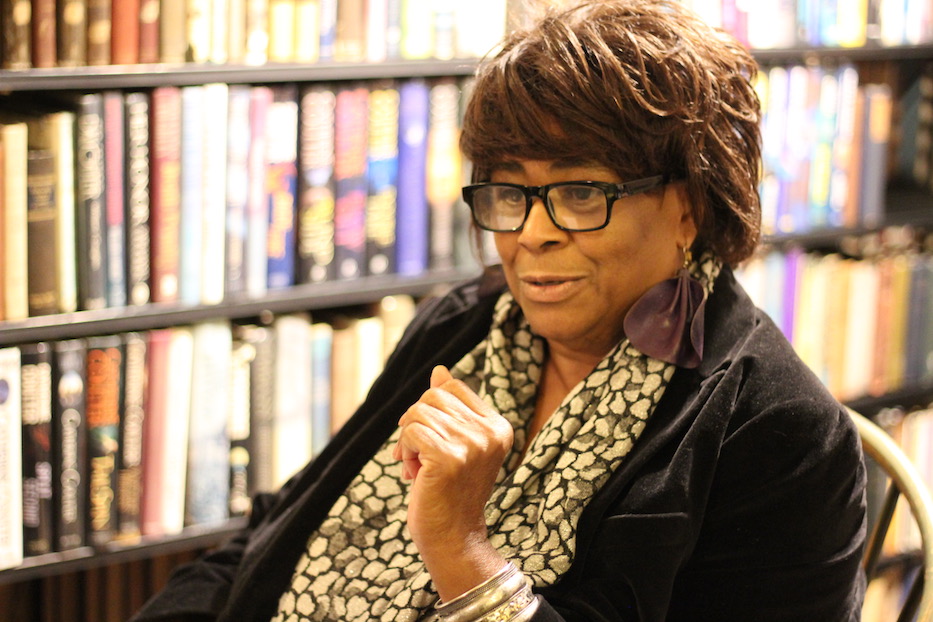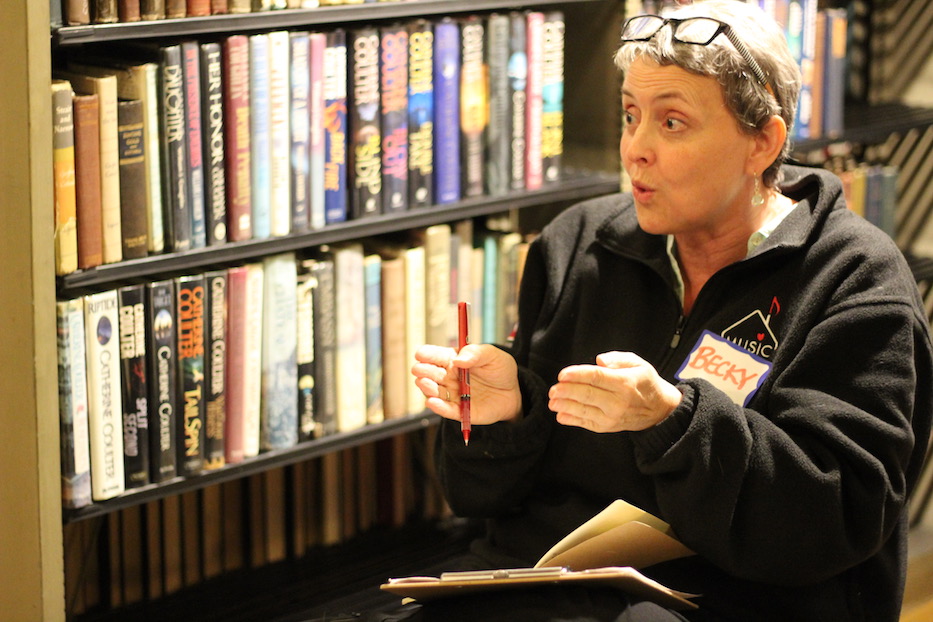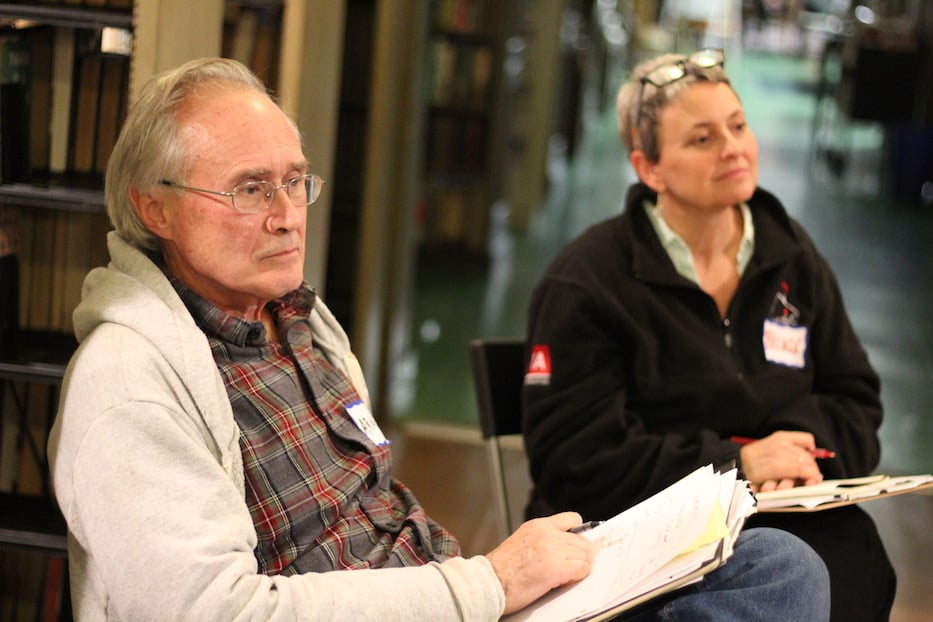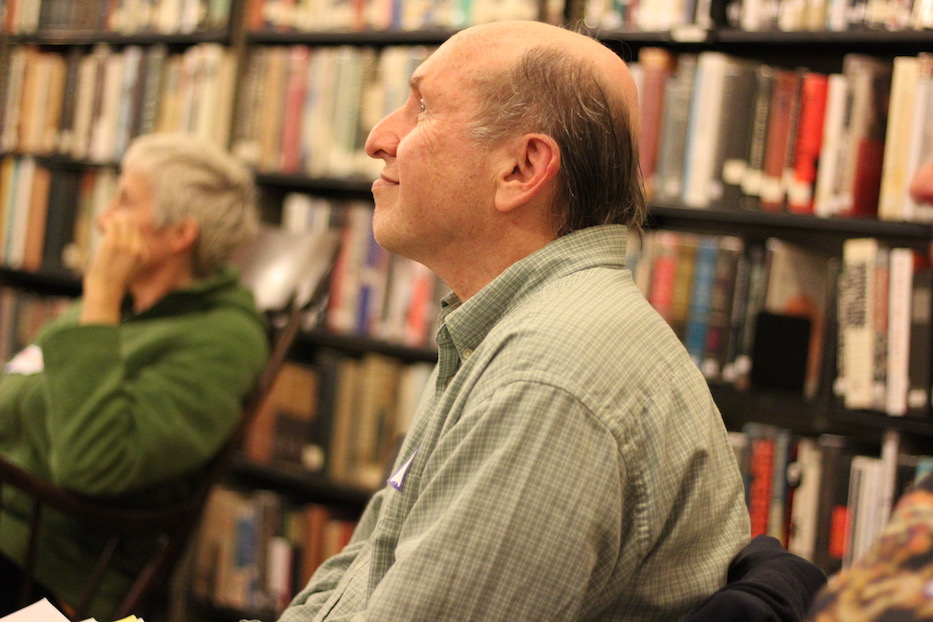
Downtown | Institute Library | Storytelling | Arnie Prichard | Arts & Culture

| Becky Paugh: “I knew this was serious business. I knew this was very serious business. But I was giddy with excitement.” Lucy Gellman Photos. |
Becky Paugh lifted her hands to an imaginary windowsill, and she was suddenly six years old, standing on her tippy toes to get a glimpse of the action below. Manny Ratafia pulled his elbow toward the floor, and in another universe his Yiddish-speaking cousin was fighting for his life, or at least for his wallet. Denise Page brought a hand to her chest, and she was a middle schooler again, kicking up sand and biking to the beach with her best friend.
They are just three of the 16 tellers preparing for the sixth annual Tellabration, a national storytelling festival that pops up each November, and has a chapter at the Institute Library in downtown New Haven. As the festival draws closer, Connecticut storytellers Arnie Pritchard and Sara deBeer have been working with tellers in a series of Thursday workshops at the library.
At each, tellers have the chance to practice their stories and get feedback, first in one-on-one settings and small groups, and then with all workshop attendees listening in. Then it’s go time: the festival, which is open to the public, is scheduled for Nov. 13 and 14. In addition to the Tellabration, Pritchard leads the IL’s monthly “Story Sharing” workshops, which resume after Tellabration.
“This is an organized effort aimed at a goal,” he said before a recent workshop. “Each person sort of picks a story and hones that story with a group.”
New Haven’s Tellabration festivities began in 2014, when a friend of Pritchard's suggested that the Institute Library might be a good fit for storytelling. At the time, Natalie Elicker had just become the organization’s director, and was building up community programming. The first year, six people read in a single evening. Five years and multiple executive directors later, demand has turned Tellabration into a two night affair (read about previous ones here, here and here).
It joins storytelling initiatives around the city and the state including Story Sharing at the IL, Storytellers New Haven, and The MOuTH-Off and Speak Up Storytelling in Hartford.

As attendees gathered on a recent Thursday, they broke off into small groups of four, burrowing into the wide rooms and creaky, book-filled nooks and crannies of the building. In one, New Havener Becky Paugh jumped into her story, transporting listeners back to her childhood on a farm far away from New Haven. Her fingers curled around an imaginary windowsill.
“I’m watching, but I can’t really see anything” she said, a childlike eagerness at the edges of her voice. The members of her group leaned in intently. “I can’t see the blood. But I’m listening. I’m listening for the gunshot. And when I hear it, I know that’s my cue.”
From that moment, Paugh had them hanging on her every word. Attendees were whisked away from the humid, staticy chill of Chapel Street to a cold farm in Montana, where she was just a girl, and helping her dad slaughter and clean a cow for the first time.
Her childhood world shifted into clear focus: snow-covered ground, through which she trudged in her boots to the barn where a cow was hung by its hooves. She walked listeners through the process of gutting the animal as if she was changing a tire.
In her world, a sharp knife glinted in her father’s hand. It sliced through skin, and cow innards were pouring out into a silver-handled bucket below, glittering and gray. Paugh knew some of the ritual, she told the group: those innards would become sausage casings. The heart would be lunch, boiled as a special treat. The hide would become velvety, valuable leather.
“I realized that it was an anatomy lesson, and that my father was the teacher,” she said. “I got to ask all the questions I wanted … and I saw the whole inside of this cow.”
In a place far away from New Haven, she watched her father cut the cow’s hide away from its lifeless, upside-down carcass. She watched as he folded it into an old quilt in the back of his pickup truck. And then she got in, to head to a butcher shop she had never seen before. In the town, a good 10 miles from their home, a white cinderblock building rose before her.
“I knew this was serious business,” she recalled. “I knew this was very serious business. But I was giddy with excitement.”
Paugh didn’t have much time alone with her dad, she explained to listeners. She was one of six girls, all of whom treated daily chores like clockwork. So this anatomy lesson and outing—it was special. Inside the shop, her father and the butcher traded details: number of T-bone steaks, how many sausages, pounds of burger. Then an odor hit her. Back among the books, she conjured the smell, so vibrant it nearly flooded the building.
“It was the most perfectly beautiful smell,” she said, her eyes closed tightly for a moment. “It smelled like pork sausage and spices, and lamb and beef and blood, all swirled together in this wet, organic, moist wonderful pungent aroma. And it’s a smell that I’ve never been able to recreate. And it’s a smell that I’ve never been able to share with anyone else.”

| Manny Ratafia. |
Around her, listeners breathed in deeply, as if to catch the scent that Paugh had hung on to for decades. This is the idea of Tellabration: for tellers to form a relationship with their stories and with their audience. Without paper—reading from the page is discouraged, although not entirely forbidden—they become griots, ferrying memories, family legacies, and untold or forgotten history lessons back out into the world.
That momentum built for Ratafia, who began his story not in New Haven but on the dark, damp streets of a bygone New York City, where his family members had gathered for a reunion decades ago. Moving from the rural farmland of Paugh’s youth to the cacophonous East Coast, he took listeners down a city block, where five family members were chatting in Yiddish when a New Yorker pulled a gun on them.
A few surprised gasps came from the group. Just as the workshop's group braced for trauma, Ratafia pulled out a surprise: his uncle Max had experience as a bodyguard in Poland, and “knew what to do” after living in Poland and Australia. So much so, in fact, that he had spent time protecting a cousin who was also a socialist revolutionary.
Ratafia’s eyes widened as he recalled his uncle Max taking on the gunman, tackling him to the ground and beating him with his elbow. To a few laughs from the group, he recalled his mother getting involved, swinging her purse to get in on the action, and mostly just confusing his uncle. Finally Max stopped. The gunman wasn’t moving. They ran away from the block, removed the bullets from the gun, and dropped both in the East River.
“And then they told the story many, many times, each slightly differently,” he said. “And it is something that my family will never forget.”

| Denise Page: Getting to craft a story. |
Other storytellers have been coming to the Tellabration workshops specifically for the training and a chance to get feedback before the formal event. Conjuring her late friend Bonita, Page began on a beach on the Connecticut shoreline, breathing in “the smell of my childhood” as she unspooled summers spent on the Milford beach, soaking in the cold water that came right up to the shoreline.
While she started still reading from the page, she assured Pritchard that she would soon be totally “off book,” ready to tell her story
For her small audience, she set up a topography of her childhood: the beach with “belly-scraping low tide,” a stucco mansion where they would pedal in enchanted circles with their bikes, summers away at camp where they coordinated reading lists and discussed novels.
She sped through whole years, her friendship growing into adulthood even as the two grew apart and moved to different places.nIn the world that she remembered, Bonita got sick. The two had one final visit, not on a beach but in a hospital. Bonita gave her a final book that she would have to devour on her own.
Page’s eyes, still misty, readjusted to the inside of the Institute Library, taking in the low-hanging lights and old books with dusty covers and weary spines. She looked around, ready to take criticism. Instead, her listeners heaped praise.
“There was so much to appreciate,” said Paugh. “So many things were so alive. There was so much life in the story. So much light and energy, and joy and savoring.”
“In a way, it’s not really a portrait of you, and it’s not really a portrait of Bonita,” Pritchard said. “It’s a portrait of the relationship between the two of you.”
Leaving the workshop, Page said it was exactly what she had hoped for.
“I just am a storyteller, and I have been for a long time,” she said after the event. “The best part here is that the group is encouraging and also honest. It gives me the opportunity not just to tell a story, but to really craft one.”
The New Haven chapter of Tellabration 2019 is scheduled for 7:30 to 9 p.m. on Wednesday, Nov. 13 and Thursday, Nov. 14 at the Institute Library at 847 Chapel St. in New Haven. Suggested donation for IL members is $10; general admission for nonmembers is $15. Students are welcome for free. For more information, visit the Institute Library's website.

